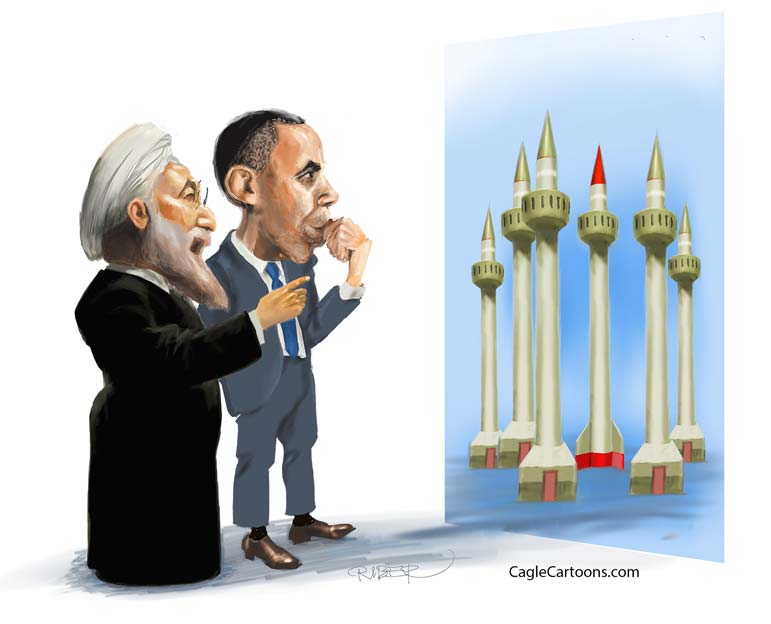
Why? The Iran nuclear deal had just been implemented a few months earlier and then Prime Minister David Cameron (as well as Home Minister Theresa May, who was then in charge of security matters in the United Kingdom) were more concerned with not implicating Tehran in threats to the West than in telling the truth about its role in international terrorism.
That's not the only recent discovery of a lie told about Iran during that period.
Just last week, the Senate Permanent Subcommittee on Investigations reported that the Obama administration gave Iran access to U.S. banks to convert $5.7 billion in assets for their use. This came after then-Secretary of the Treasury Jacob Lew promised Congress that Iran would not be allowed to use the U.S. financial system. Only a few months after Lew and his aides made that pledge, his department issued a license authorizing the conversion of Iranian assets and encouraged American banks to take part in the scheme.
The Senate report also reveals that the Obama administration took part in efforts to encourage foreign banks to aid the Iranians and then promised those involved that they need fear nothing more than a wrist slap when they violated U.S. sanctions.
We already knew about other deceptions involving the passage of the nuclear deal. There were the side deals on inspections concluded between Iran and the United States that weakened the already shaky monitoring of Iran's nuclear program hidden from Congress. And then there was the infamous flight of a U.S. plane to Tehran loaded with $400 million in foreign currency as ransom payments, as well as two further flights containing $1.3 billion in cash.
There was also the fact that the administration quashed a federal drug probe into the $1 billion a year narcotics smuggling being operated by Hezbollah in Latin America. We didn't learn about that until it was revealed in a Politico magazine exposé in December of 2017.
But as far as most of the anti-Trump “resistance” or its cheerleaders in the mainstream media are concerned, all we've heard about the London Hezbollah plot, the Treasury Department's lies or the other stories are crickets.
Still, some would ask why any of this matters now? Obama's been out of office for years.
But the efforts by Obama and our European allies to deceive the world about what they were doing to appease the Iranians and Iran's involvement in international terrorism and crime are not ancient history or irrelevant efforts to chip away at the reputation of Trump's predecessor. To the contrary, they matter very much to the discussion about efforts to tighten sanctions on Iran and force it renegotiate the nuclear deal. That's significant because the pact not only provided Tehran with a financial windfall that helped it finance Hezbollah and other terrorists groups, but gave the Islamist regime a path to an eventual nuclear weapon once it expires in 2025.
The story of the lies told by Obama, Lew, Secretary of State John Kerry, Energy Secretary Ernest Moritz and Deputy National Security Advisor Ben Rhodes (the latter two both promised “anytime, anywhere” inspections of Iranian sites that never happened) about Iran was a dismal chapter in American political history. But those deceptions should also inform our discussion of whether their legacy achievement should be preserved.
Obama said that the deal gave Iran a chance to “get right with the world.” But instead, it gave it gave it a green light to step up its support of terror, allowing it to launch a war in Yemen and to aid terror groups that have missiles aimed at Israeli cities as part of its ambition for regional hegemony.
Democrats and other Obama apologists and Trump critics say the deal still did what it set out to do by preventing Iran from going nuclear. But that, too, was a lie since the deal allowed Tehran to keep its most advanced technology and gave it a path to a weapon once the sunset clauses kicked in.
Obama's failure in the negotiations made it imperative for his successors to correct his mistakes and to drive Iran back to the table, where it must be stripped of its nuclear options and its ability to fund terror. Trump has, much to the chagrin of Obama's old media “echo chamber,” made real progress towards that end with reimposed sanctions that have brought Iran's economy to a standstill and prevented the Europeans from giving it a way to evade economic restrictions on commerce.
So when the Democratic presidential candidates vow to bring the United States back into the nuclear deal and lift current sanctions, they are not only planning to empower and enrich Iran, they are also, in effect, owning the lies that were the foundation of Obama's effort to sell it to the American people.
If we don't hear much about these attempts to stifle the truth for the sake of bolstering the rogue regime in Tehran, it's because Obama's old media allies are no more interested in the truth about either the deal or Iran now that Trump's pressure is succeeding than they were a few years ago. Yet it is precisely the truth about Iranian activities and Obama's deceptions that can help us understand why Trump's policy on this issue is correct.
Every weekday JewishWorldReview.com publishes what many in the media and Washington consider "must-reading". Sign up for the daily JWR update. It's free. Just click here.
(COMMENT, BELOW)
Jonathan S. Tobin is editor in chief of Jewish News Service. He's been a JWR contributor since 1998.


 Contact The Editor
Contact The Editor
 Articles By This Author
Articles By This Author